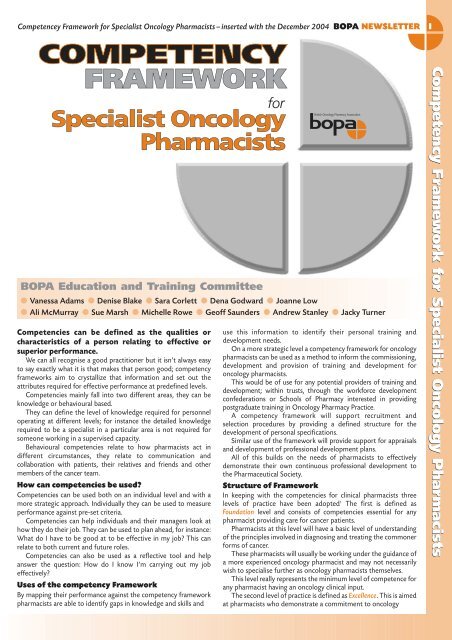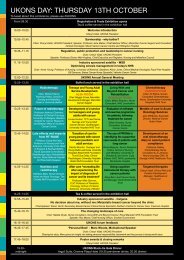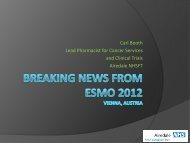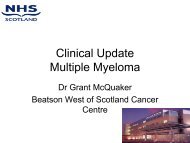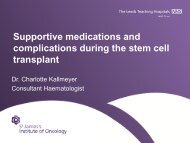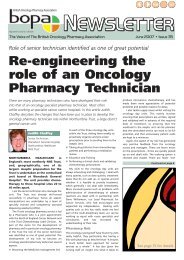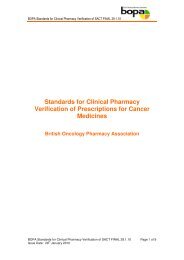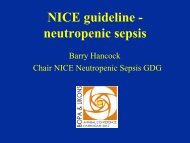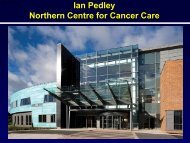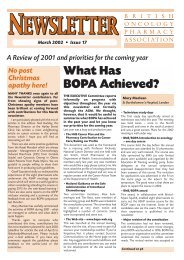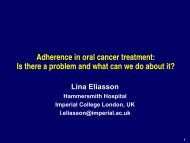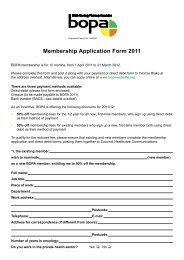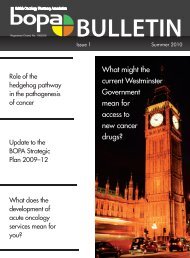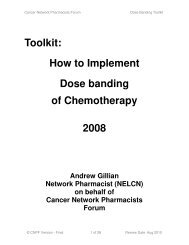Competency Framework for Specialist Oncology ... - BOPA
Competency Framework for Specialist Oncology ... - BOPA
Competency Framework for Specialist Oncology ... - BOPA
You also want an ePaper? Increase the reach of your titles
YUMPU automatically turns print PDFs into web optimized ePapers that Google loves.
Competencey <strong>Framework</strong> <strong>for</strong> <strong>Specialist</strong> <strong>Oncology</strong> Pharmacists – inserted with the December 2004 <strong>BOPA</strong> NEWSLETTER<br />
COMPETENCY<br />
FRAMEWORK<br />
<strong>BOPA</strong> Education and Training Committee<br />
● Vanessa Adams ● Denise Blake ● Sara Corlett ● Dena Godward ● Joanne Low<br />
● Ali McMurray ● Sue Marsh ● Michelle Rowe ● Geoff Saunders ● Andrew Stanley ● Jacky Turner<br />
Competencies can be defined as the qualities or<br />
characteristics of a person relating to effective or<br />
superior per<strong>for</strong>mance.<br />
We can all recognise a good practitioner but it isn’t always easy<br />
to say exactly what it is that makes that person good; competency<br />
frameworks aim to crystallize that in<strong>for</strong>mation and set out the<br />
attributes required <strong>for</strong> effective per<strong>for</strong>mance at predefined levels.<br />
Competencies mainly fall into two different areas, they can be<br />
knowledge or behavioural based.<br />
They can define the level of knowledge required <strong>for</strong> personnel<br />
operating at different levels; <strong>for</strong> instance the detailed knowledge<br />
required to be a specialist in a particular area is not required <strong>for</strong><br />
someone working in a supervised capacity.<br />
Behavioural competencies relate to how pharmacists act in<br />
different circumstances, they relate to communication and<br />
collaboration with patients, their relatives and friends and other<br />
members of the cancer team.<br />
How can competencies be used?<br />
Competencies can be used both on an individual level and with a<br />
more strategic approach. Individually they can be used to measure<br />
per<strong>for</strong>mance against pre-set criteria.<br />
Competencies can help individuals and their managers look at<br />
how they do their job. They can be used to plan ahead, <strong>for</strong> instance:<br />
What do I have to be good at to be effective in my job? This can<br />
relate to both current and future roles.<br />
Competencies can also be used as a reflective tool and help<br />
answer the question: How do I know I’m carrying out my job<br />
effectively?<br />
Uses of the competency <strong>Framework</strong><br />
By mapping their per<strong>for</strong>mance against the competency framework<br />
pharmacists are able to identify gaps in knowledge and skills and<br />
<strong>for</strong><br />
<strong>Specialist</strong> <strong>Oncology</strong><br />
Pharmacists<br />
use this in<strong>for</strong>mation to identify their personal training and<br />
development needs.<br />
On a more strategic level a competency framework <strong>for</strong> oncology<br />
pharmacists can be used as a method to in<strong>for</strong>m the commissioning,<br />
development and provision of training and development <strong>for</strong><br />
oncology pharmacists.<br />
This would be of use <strong>for</strong> any potential providers of training and<br />
development; within trusts, through the work<strong>for</strong>ce development<br />
confederations or Schools of Pharmacy interested in providing<br />
postgraduate training in <strong>Oncology</strong> Pharmacy Practice.<br />
A competency framework will support recruitment and<br />
selection procedures by providing a defined structure <strong>for</strong> the<br />
development of personal specifications.<br />
Similar use of the framework will provide support <strong>for</strong> appraisals<br />
and development of professional development plans.<br />
All of this builds on the needs of pharmacists to effectively<br />
demonstrate their own continuous professional development to<br />
the Pharmaceutical Society.<br />
Structure of <strong>Framework</strong><br />
In keeping with the competencies <strong>for</strong> clinical pharmacists three<br />
levels of practice have been adopted 1 The first is defined as<br />
Foundation level and consists of competencies essential <strong>for</strong> any<br />
pharmacist providing care <strong>for</strong> cancer patients.<br />
Pharmacists at this level will have a basic level of understanding<br />
of the principles involved in diagnosing and treating the commoner<br />
<strong>for</strong>ms of cancer.<br />
These pharmacists will usually be working under the guidance of<br />
a more experienced oncology pharmacist and may not necessarily<br />
wish to specialise further as oncology pharmacists themselves.<br />
This level really represents the minimum level of competence <strong>for</strong><br />
any pharmacist having an oncology clinical input.<br />
The second level of practice is defined as Excellence. This is aimed<br />
at pharmacists who demonstrate a commitment to oncology<br />
I<br />
<strong>Competency</strong> <strong>Framework</strong> <strong>for</strong> <strong>Specialist</strong> <strong>Oncology</strong> Pharmacists
II COMPETENCY FRAMEWORK <strong>for</strong> <strong>Specialist</strong> <strong>Oncology</strong> Pharmacists<br />
III<br />
practice. Any pharmacist called an oncology pharmacist or<br />
equivalent should be at or aiming <strong>for</strong> this level of practice.<br />
Pharmacists practising at this level will have an in depth<br />
knowledge of the treatment and support of patients with a wider<br />
range of cancers. This is the minimum desirable level <strong>for</strong> a<br />
pharmacist practising in oncology without the lead of a more<br />
experienced pharmacist.<br />
The third level of practice is defined as Mastery. This describes<br />
the activity of a pharmacist acknowledged to be a specialist in<br />
oncology pharmacy practice. Pharmacists operating at this level will<br />
usually have a more strategic view of oncology pharmacy. They will<br />
have considerable in depth knowledge across a wide range of<br />
conditions.<br />
The three levels in the competency framework are not<br />
necessarily discrete. Each level builds on the one be<strong>for</strong>e creating a<br />
wider viewpoint at each stage thus there is a gradation in<br />
understanding at different levels.<br />
Pharmacists mapping their activities will find themselves<br />
operating across several levels. This facilitates the <strong>for</strong>mulation of<br />
professional development plans.<br />
Main Dimensions of <strong>Framework</strong><br />
The main dimensions of the framework can be divided into<br />
knowledge based and behavioural competencies<br />
Knowledge based competencies cover:<br />
● Understanding cancer and its treatment<br />
● Pharmaceutical considerations in the provision of care <strong>for</strong><br />
cancer patients<br />
● Supportive and palliative care<br />
● Health promotion and education<br />
These are areas that should be included in pharmacists’ own<br />
continuous professional development programmes<br />
Foundation<br />
● Pharmacists at this level will<br />
have a basic level of<br />
understanding of the principles<br />
involved in diagnosing and<br />
treating the commoner <strong>for</strong>ms of<br />
cancer. These pharmacists will<br />
usually be working under the<br />
guidance of a more experienced<br />
oncology pharmacist and may<br />
not necessarily wish to specialise<br />
further as oncology pharmacists<br />
themselves<br />
● This level represents the<br />
minimum level of competence <strong>for</strong><br />
any pharmacist having an<br />
oncology clinical input<br />
Behavioural competencies cover:<br />
● Intra professional collaboration<br />
● Communication<br />
● In<strong>for</strong>ming, involving and supporting patients<br />
These competencies would lend themselves to assessment through<br />
portfolio development.<br />
Evidence of <strong>Competency</strong><br />
It is up to each individual and their manager to decide how each<br />
competency is best demonstrated. Knowledge based competencies<br />
can be demonstrated through use of multiple choice questions or<br />
successful completion of continuous educational activities.<br />
Behavioural competencies can be demonstrated through reflective<br />
statements and records kept of clinical activities.<br />
Summary<br />
The <strong>BOPA</strong> competency framework <strong>for</strong> specialist oncology<br />
pharmacists is a tool that can be used by individual pharmacists in<br />
the development of their personal careers as well as planning their<br />
own continuous professional development. There will be fluidity<br />
between Foundation, Excellence and Mastery levels, with the<br />
assumption that once individuals are competent at one level they<br />
would continue to develop skills in the next. Skills in areas within<br />
sections will not develop at equal rates, so that at any one time an<br />
individual may be at foundation level in one section but mastery in<br />
another. The framework can also be used by the profession to<br />
define effective activity at different levels and use this in<strong>for</strong>mation<br />
to commission or design educational courses <strong>for</strong> oncology<br />
pharmacists.<br />
1 G Davies, D Webb, D McRobbie, I Bates. A <strong>Competency</strong> based<br />
approach to fitness <strong>for</strong> practice. Pharmaceutical Journal 2002:<br />
(268) 104-106.<br />
Excellence<br />
As Foundation Plus<br />
● This is aimed at pharmacists who<br />
demonstrate a commitment to<br />
oncology practice. Any<br />
pharmacist called an oncology<br />
pharmacist or equivalent should<br />
be at or aiming <strong>for</strong> this level of<br />
practice. Pharmacists practising<br />
at this level will have an in depth<br />
knowledge of the treatment and<br />
support of patients with a wider<br />
range of cancers<br />
● This is the minimum desirable<br />
level <strong>for</strong> a pharmacist practising<br />
in oncology without the lead of a<br />
more experienced pharmacist<br />
Mastery<br />
As Excellence Plus<br />
● This describes the activity of a<br />
pharmacist acknowledged to be<br />
a specialist in oncology pharmacy<br />
practice. Pharmacists operating at<br />
this level will usually have a<br />
more strategic view of oncology<br />
pharmacy<br />
● They will have considerable in<br />
depth knowledge across a wide<br />
range of conditions.<br />
Understanding Cancer<br />
● Understands the causes of cancer<br />
and has an awareness of the<br />
disease process<br />
● Knowledge of the key roles of the<br />
oncology, haematology and<br />
palliative care teams<br />
● Understands the structure of<br />
cancer services e.g. role of<br />
networks, the difference between<br />
units and centres etc.<br />
● Understands common<br />
terminology used in cancer<br />
● Understands impact of cancer on<br />
patients and families.<br />
● Demonstrates a comprehensive<br />
understanding of the patient’s<br />
cancer journey.<br />
● Understands likely disease<br />
progression within their scope of<br />
practice and impact on patients<br />
cancer journey.<br />
● Demonstrates a comprehensive<br />
understanding of the treatments,<br />
therapies and the role a higherlevel<br />
practitioner plays in the<br />
holistic care of the patient.<br />
● Assesses and advises on the<br />
impact national initiatives will<br />
have upon local cancer services<br />
● Developes recommendations on<br />
the delivery of innovative cancer<br />
practice.<br />
● Actively participates in the<br />
development and configuration<br />
of cancer services within their<br />
locality.<br />
● Personally contributes to and<br />
utilises evidence to in<strong>for</strong>m own<br />
practice and that of others.
Competencey <strong>Framework</strong> <strong>for</strong> <strong>Specialist</strong> <strong>Oncology</strong> Pharmacists – inserted with the December 2004 <strong>BOPA</strong> NEWSLETTER<br />
Foundation<br />
Excellence<br />
As Foundation Plus<br />
Mastery<br />
As Excellence Plus<br />
III<br />
Understanding Cancer<br />
Epidemiology<br />
of cancer<br />
Pathophysiology<br />
and symptoms<br />
of cancer<br />
General therapeutics<br />
and treatment goals<br />
Principles<br />
of chemotherapy<br />
● Incidence and prevalence of<br />
common cancers (breast, lung<br />
and colorectal) and those within<br />
their scope of practice<br />
The cancers within the scope<br />
of practice<br />
Knowledge of:<br />
● Characteristics<br />
● Common metastatic<br />
presentations<br />
● Associated Symptoms<br />
● Curative, adjuvant, neo-adjuvant<br />
and palliative goals, when these<br />
each apply and the clinical<br />
implications<br />
● Patients expectations of treatment<br />
● Awareness of the use of<br />
combined modality treatment<br />
e.g chemoradiation<br />
● Awareness of the use of systemic<br />
therapy, radiotherapy, surgical<br />
oncology and supportive care to<br />
achieve goals<br />
Knowledge of:<br />
● Classification and mechanism of<br />
action of chemotherapy and<br />
hormonal agents<br />
● Cell cycle and cell kill hypothesis<br />
● Scheduling and basic principles of<br />
combination chemotherapy<br />
● Ways of monitoring<br />
tumour responses and<br />
disease progression<br />
● Knowledge to act as a specialist<br />
resource <strong>for</strong> advice and support<br />
to health professionals, patients<br />
and carers.<br />
● Provides education and training to<br />
health professionals, patients and<br />
carers within own specialist area<br />
● Knowledge of the national<br />
cancer agenda<br />
● Incidence and prevalence of<br />
cancers treated within their Trust<br />
● Knowlege of anatomic<br />
characteristics of cancers and<br />
their metastasic presentations<br />
encountered within their Trust<br />
● Symptoms associated with<br />
these cancers<br />
● Knowledge of relevant genes and<br />
awareness that they are not necessarily<br />
cancer specific e.g. HER2<br />
● Use of advanced therapeutics<br />
(e.g. bone marrow/stem cell<br />
transplant) to achieve goals<br />
● Knowledge of locally used<br />
staging and its role in treatment<br />
decisions<br />
● Staging systems and their role in<br />
treatment decisions<br />
Knowledge of:<br />
● Classification and mechanism of<br />
action of other cancer treatment<br />
drugs<br />
● Differentiation between drugs<br />
from same class<br />
● Modulation of chemotherapy<br />
drugs by non-chemotherapy<br />
agents<br />
● Pharmacokinetics and pharmacodynamics<br />
of chemotherapy<br />
and other cancer treatment drugs<br />
● Measurement of response, survival<br />
and other tumour outcomes <strong>for</strong><br />
cancers within scope of practice<br />
● Knowledge of specialist centres<br />
<strong>for</strong> specific cancers.<br />
● Knowledge of incidence and<br />
prevalence of cancers treated<br />
within their network<br />
● Knowledge of changing trends in<br />
cancer epidemiology<br />
● Characteristics of cancers,<br />
treated within the network<br />
including rare tumours and<br />
childhood cancers their<br />
metastatic presentations,<br />
symptoms and relevant genes.<br />
● Psychosocial goals associated<br />
with systemic therapy<br />
● Understanding of patient<br />
decision-making processes<br />
Knowledge of:<br />
● Pharmacogenetics of<br />
chemotherapy drugs<br />
● Principles of new anticancer drug<br />
development<br />
● Principles of gene therapy<br />
● Principles of drug resistance<br />
● Differentiation of survival<br />
outcomes (overall, progressionfree,<br />
relapse free, etc.); meaning<br />
of complete, partial responses,<br />
stable disease, etc.<br />
<strong>Competency</strong> <strong>Framework</strong> <strong>for</strong> <strong>Specialist</strong> <strong>Oncology</strong> Pharmacists<br />
Regimens<br />
● Knowledge of first line and<br />
relapse regimens used within<br />
scope of practice<br />
● Demonstrates ability to accurately<br />
verify chemotherapy prescriptions<br />
within scope of practice<br />
Knowledge of:<br />
● First line and relapse regimens<br />
<strong>for</strong> cancers treated within Trust<br />
● Ability to advise on and query<br />
appropriateness of prescribed<br />
regimens<br />
● Develops network wide protocols<br />
combining drug regimen and<br />
supportive treatment, monitoring<br />
and dosage adjustment criteria
IV COMPETENCY FRAMEWORK <strong>for</strong> <strong>Specialist</strong> <strong>Oncology</strong> Pharmacists<br />
Foundation<br />
III<br />
Excellence<br />
As Foundation Plus<br />
Mastery<br />
As Excellence Plus<br />
Regimens<br />
● Knowledge of current treatment<br />
guidelines e.g. NICE, SIGN etc.<br />
● Implements new treatment<br />
protocols and guidelines<br />
● Able to assessment compliance<br />
and ability to manage oral<br />
chemotherapy<br />
● Able to demonstrate an<br />
appropriate treatment schedule<br />
<strong>for</strong> a chemotherapy regimen with<br />
supportive treatment<br />
Monitoring and<br />
management of<br />
common toxicities of<br />
cancer treatment<br />
Knowledge of:<br />
● Monitoring and management of<br />
regimen toxicities (including<br />
those that are dose limiting) used<br />
within scope of practice<br />
● Monitoring blood counts with<br />
chemotherapy<br />
● Treatment and prevention of<br />
common toxicities<br />
● Dose reductions or delays <strong>for</strong><br />
neutropenia and other toxicities<br />
<strong>for</strong> regimens used within scope<br />
of practice.<br />
● Dose reductions in renal and<br />
hepatic impairment<br />
● Documentation of toxicities<br />
● Monitoring organ function tests<br />
with drugs that may cause organ<br />
toxicities<br />
Knowledge of:<br />
● Monitoring and management of<br />
toxicities of regimens used within<br />
Trust<br />
● Monitoring effectiveness of<br />
antiemetic therapy<br />
● Dose modification strategies<br />
● Identification of patients at risk<br />
of toxicity<br />
● Distinction between early and<br />
late onset toxicities,<br />
accumulation effect (incl.<br />
paediatric and young patients)<br />
● Toxicity grading scales<br />
● Documentation of extravasation<br />
● Evaluation, development and<br />
implementation of policies and<br />
guidelines to minimise toxicities<br />
● Knowledge of policies to reduce<br />
occurrence or treat toxicities<br />
relevant to diseases treated<br />
within Trust, e.g. use of irradiated<br />
blood products with fludarabine<br />
or management of GVHD<br />
Knowledge of:<br />
● Monitoring other objective and<br />
subjective toxicities, including<br />
pain<br />
● Evaluation of cancer<br />
outcome tests<br />
● Unusual drug toxicities<br />
● Advantages and disadvantages<br />
of assessment tools <strong>for</strong><br />
measuring specific toxicities<br />
● Ensures systems in place to<br />
communicate potential side<br />
effects and management of them<br />
to primary and other secondary<br />
health workers<br />
Common symptoms of<br />
disease or treatment<br />
● Awareness of symptoms and<br />
management of<br />
• Mucositis<br />
• Neutropenia<br />
• Pain<br />
• Extravasation<br />
• Hypercalcaemia<br />
• Diarrhoea<br />
• Nausea and vomiting<br />
• Constipation<br />
• Palmar-plantar<br />
• Hypersensitivity reactions<br />
• Tumour lysis syndrome<br />
● Common symptom control drugs,<br />
including analgesics<br />
● Antibiotic regimens and growth<br />
factors <strong>for</strong> febrile neutropenia<br />
● Use of mesna<br />
● Use of folinic acid rescue<br />
● Understands and makes<br />
recommendations <strong>for</strong> the<br />
management of symptoms<br />
• Electrolyte disturbances<br />
• Infections<br />
• Dyspnoea<br />
• Bleeding<br />
• Obstruction<br />
• Ifosfamide encephalopathy<br />
• Hydration regimes and<br />
management of fluid balance<br />
• Alkalinisation of urine<br />
● Symptoms and management of<br />
oncological emergencies<br />
• Superior vena cava obstruction<br />
• Spinal cord compression<br />
• Hypersensitivity reactions<br />
• Anaemia and the role of<br />
epoetin/blood<br />
● Develops and evaluates local<br />
drug related policies<br />
● Develops network treatment<br />
protocols <strong>for</strong> management of<br />
symptoms of disease or<br />
treatment<br />
● Disseminates evaluated research<br />
on chemotherapy drugs, advises<br />
on <strong>for</strong>mulary changes, and<br />
in<strong>for</strong>ms policies<br />
● Acts as expert<br />
advisor/stakeholder <strong>for</strong> national<br />
policies and guidelines
Competencey <strong>Framework</strong> <strong>for</strong> <strong>Specialist</strong> <strong>Oncology</strong> Pharmacists – inserted with the December 2004 <strong>BOPA</strong> NEWSLETTER<br />
Foundation<br />
Excellence<br />
Mastery<br />
As Foundation Plus<br />
As Excellence Plus<br />
V<br />
Calculation of<br />
chemotherapy doses,<br />
including body surface<br />
area (BSA)<br />
determination<br />
Routes of administration<br />
of commonly used<br />
systemic agents<br />
Use of speciality<br />
devices <strong>for</strong><br />
drug administration,<br />
including<br />
infusion pumps<br />
Procedures <strong>for</strong><br />
safe handling of<br />
chemotherapy<br />
● Able to per<strong>for</strong>m dose calculations<br />
using weight or BSA<br />
● Able to use locally available BSA<br />
calculators (adult and paediatric)<br />
● Able to use calculation of<br />
carboplatin dosing using<br />
Calvert equation<br />
● Awareness of dose banding,<br />
capping and rounding doses<br />
● Awareness of routes by which<br />
drugs used within scope of<br />
practice can be given<br />
● Awareness of national and<br />
local intrathecal policy and<br />
practical implications<br />
● Demonstrates awareness of use<br />
of pole-mounted intravenous<br />
pumps in the hospital<br />
● Able to describe drugs used,<br />
within scope of practice, which<br />
require filters, specific lines etc<br />
● Awareness of stability, compatibility<br />
and storage <strong>for</strong> drugs<br />
used within scope of practice<br />
● Knowledge of basic safe handling<br />
procedures <strong>for</strong> pharmacy and<br />
chemotherapy nursing staff<br />
including spillage, disposal of<br />
chemotherapeutic waste<br />
● Demonstrates basic<br />
understanding of occupational<br />
hazards of exposure to<br />
chemotherapy drugs and waste<br />
● Understands causes of exposure<br />
to chemotherapy<br />
● Able to describe precautions<br />
when extemporaneously<br />
preparing or manufacturing oral<br />
<strong>for</strong>mulations of chemotherapy<br />
(e.g. <strong>for</strong> paediatrics or clinical<br />
trial materials)<br />
● Able to calculate lean body<br />
weight and ideal BSA<br />
● Knowledge of issues surrounding<br />
obesity, renal and hepatic function<br />
and low albumins etc on dosing<br />
● Able to per<strong>for</strong>m dosing<br />
calculations <strong>for</strong> chemotherapy in<br />
paediatric populations<br />
● Awareness of routes by which<br />
drugs used within Trust can be<br />
given<br />
● Awareness of differences in<br />
<strong>for</strong>mulations required <strong>for</strong><br />
different routes<br />
● Awareness of clinical relevance of<br />
infusion rate <strong>for</strong> different<br />
chemotherapy drugs<br />
● Awareness of rationale behind<br />
order in which chemotherapy<br />
drugs are given and their timing<br />
● Awareness of policy <strong>for</strong> home<br />
administration of chemotherapy<br />
relevant to scope of practice<br />
● Knowledge of use and<br />
advantages and disadvantages of<br />
different types of administration<br />
devices used within local area <strong>for</strong><br />
chemotherapy and symptom<br />
control<br />
● Awareness of stability, compatibility<br />
and storage conditions<br />
required <strong>for</strong> chemotherapy drugs<br />
● Ensures measures are in place to<br />
minimise risks when patients are<br />
having chemotherapy at home<br />
(oral and iv)<br />
● Able to provide advice <strong>for</strong><br />
patients re: handling<br />
chemotherapy at home (spills,<br />
handling of contaminated linen<br />
etc)<br />
● Knowlege of practical and<br />
administrative aspects of<br />
legislative requirements <strong>for</strong> safe<br />
handling/waste management<br />
● Able to provide advice <strong>for</strong> patients<br />
and carers re: handling potentially<br />
contaminated waste at home<br />
● Able to provide advice <strong>for</strong><br />
pregnant and breastfeeding staff<br />
re: handling chemotherapy and<br />
contaminated waste<br />
● Knowledge of personnel<br />
monitoring<br />
● Awareness of different<br />
mathematical models <strong>for</strong><br />
dose calculation<br />
● Awareness of routes by which<br />
drugs within the Network can<br />
be given<br />
● Awareness of development of<br />
local policies in accordance with<br />
national guidelines<br />
● Awareness of new infusion<br />
devices and technological<br />
advances relevant to<br />
chemotherapy administration<br />
● Knowledge of alternative<br />
approaches to therapy,<br />
e.g. Circadian rhythm infusions,<br />
pulsed therapy<br />
● Understands occupational<br />
exposure<br />
● Understands implications of<br />
developing technologies e.g.<br />
gene therapy products and<br />
monoclonal antibodies<br />
<strong>Competency</strong> <strong>Framework</strong> <strong>for</strong> <strong>Specialist</strong> <strong>Oncology</strong> Pharmacists
VI COMPETENCY FRAMEWORK <strong>for</strong> <strong>Specialist</strong> <strong>Oncology</strong> Pharmacists<br />
Foundation<br />
III<br />
Excellence<br />
As Foundation Plus<br />
Mastery<br />
As Excellence Plus<br />
Documentation of<br />
systemic treatment<br />
orders and delivery<br />
● Documentation of<br />
pharmaceutical care activities<br />
and outcomes including those<br />
specific to oncology<br />
● Documentation of treatments<br />
outcomes, pharmaceutical<br />
interventions and advice related<br />
to chemotherapy on health<br />
records<br />
● Documentation of clinical<br />
trial requirements<br />
● Documentation of systemic<br />
therapy in electronic or automated<br />
systems <strong>for</strong> health records<br />
● Knowledge and evaluation of<br />
different prescribing<br />
systems/prescription <strong>for</strong>mats<br />
(including computerised)<br />
Interactions between<br />
cancer treatment/<br />
supportive care drugs<br />
and other drugs/foods<br />
● Understands clinical significance<br />
of drug-drug and drug-food<br />
interactions with chemotherapy<br />
drugs and drugs used to prevent<br />
and alleviate symptoms, within<br />
area of practice.<br />
● Understands clinical significance<br />
of drug-drug and drug-food<br />
interactions with chemotherapy<br />
drugs, and drugs used to prevent<br />
and alleviate symptoms used<br />
withinTrust.<br />
● Knowledge of chemotherapy<br />
drugs which are sensitised by<br />
radiotherapy<br />
● Able to assess potential of<br />
interactions with investigational<br />
agents<br />
● Knowledge of clinical significance<br />
of drug-drug and drug-food<br />
interactions to individual patients<br />
circumstances<br />
Advice on<br />
complimentary and<br />
alternative medicine<br />
in relation to<br />
chemotherapy<br />
● Awareness of commonly used<br />
alternative medicines <strong>for</strong><br />
cancer applications within scope<br />
of practice<br />
● Understands reasons why cancer<br />
and haematology patients use<br />
alternative medicines<br />
● Understands evidence of effectiveness<br />
and safety <strong>for</strong> complementary<br />
and alternative medications used<br />
within scope of practice<br />
● Able to critically appraise<br />
evidence <strong>for</strong> alternative<br />
medicines and therapies used<br />
within network<br />
● Able to access in<strong>for</strong>mation on<br />
complementary and alternate<br />
therapies used within<br />
oncology/haematology<br />
● Knowledge of contra-indications<br />
to alternative therapies within<br />
scope of practice<br />
Goals of supportive<br />
and palliative care <strong>for</strong><br />
cancer patients<br />
● Understands common<br />
goals <strong>for</strong> reduction of pain and<br />
adverse symptoms seen within<br />
scope of practice<br />
● Understands total pain<br />
management<br />
● Understands psychosocial needs<br />
of cancer patients<br />
● Knowledge and evaluation of<br />
drug treatments <strong>for</strong> relieving<br />
symptoms not usually used<br />
within network practice<br />
● Understands measurement of<br />
supportive care outcomes and QOL<br />
Use of supportive care<br />
and symptom<br />
management<br />
treatments<br />
Knowledge of:<br />
● Use of analgesics and adjuvant<br />
therapy <strong>for</strong> pain management<br />
● Awareness of management and<br />
treatment protocols <strong>for</strong><br />
cancer/haematological symptoms<br />
(e.g. constipation, diarrhoea,<br />
dyspnoea, cough, etc.) seen<br />
within scope of practice<br />
Knowledge of:<br />
● Role of pharmacologic and nonpharmacologic<br />
pain management<br />
● Application of pharmaceutical<br />
care <strong>for</strong> symptom control<br />
● Evaluation of symptom control<br />
protocols and practices within<br />
network<br />
● Use of radiotherapy and chemotherapy<br />
<strong>for</strong> supportive care and<br />
pain management within scope<br />
of practice<br />
Knowledge of:<br />
● Integration of pharmacologic<br />
interventions with other<br />
treatments<br />
● Use of radiotherapy and<br />
chemotherapy <strong>for</strong> supportive care<br />
and pain management within<br />
network<br />
Health promotion<br />
and education<br />
Demonstrates awareness of:<br />
● The causes and prevention<br />
of cancer<br />
● Health education and promotion<br />
issues<br />
● Resources available <strong>for</strong><br />
health promotion<br />
● Understands the principle of<br />
health promotion and the causes<br />
of cancer and apply these within<br />
their practice<br />
● Actively participate in health<br />
promotion of healthy lifestyles to<br />
foster cancer prevention<br />
● Understands the principles of<br />
health promotion in relation to<br />
cancers within the network<br />
● Be involved in the education and<br />
promotion of health lifestyles in<br />
cancer patients, their families,<br />
staff and the general public
Competencey <strong>Framework</strong> <strong>for</strong> <strong>Specialist</strong> <strong>Oncology</strong> Pharmacists – inserted with the December 2004 <strong>BOPA</strong> NEWSLETTER<br />
Foundation<br />
Excellence<br />
Mastery<br />
As Foundation Plus<br />
As Excellence Plus<br />
VII<br />
Screening<br />
Funding/<br />
Commissioning issues<br />
Communication with<br />
caregivers in the home,<br />
in other institutions and<br />
in the community<br />
In<strong>for</strong>ming, involving<br />
and supporting patients<br />
● Awareness of the screening<br />
programs available <strong>for</strong> the<br />
general public and cancer<br />
patients<br />
● Awareness of role/implications of<br />
advisory bodies e.g. NICE/Scottish<br />
Medicines Consortium<br />
Knowledge of communication<br />
channels within scope of<br />
practice with:<br />
● Patient’s family members and<br />
close friends from the community<br />
● Home care nursing and other<br />
caregivers in the home<br />
● Other caregivers, including those<br />
from referral sites<br />
● Awareness of confidentiality/<br />
sensitivity issues in cancer care<br />
Within their scope of practice:<br />
● Knowledge of in<strong>for</strong>mation and<br />
support needs of patients and<br />
their families and the<br />
organisations that can provide<br />
in<strong>for</strong>mation and support.<br />
● Knowledge to impart in<strong>for</strong>mation<br />
to patients and their carers in an<br />
appropriate <strong>for</strong>mat/language on<br />
their systemic treatment and<br />
supportive care medications<br />
(regimen schedule, possible side<br />
effects and their management<br />
and prevention)<br />
● Knowledge of education and<br />
patient in<strong>for</strong>mation leaflets<br />
patients and carers should<br />
receive <strong>for</strong> specific<br />
regimens/treatments<br />
● Awareness of the screening<br />
programs available within the<br />
Network and the implications of<br />
these <strong>for</strong> patients and the general<br />
public<br />
● Awareness of the funding<br />
streams available <strong>for</strong> new cancer<br />
drugs and how to access them<br />
● Able to monitor and report on<br />
trends in expenditure<br />
Knowledge of communication<br />
channels within network including:<br />
● Cancer treatment specialists from<br />
whom referrals are received<br />
● Family physician communications<br />
● Other local specialists <strong>for</strong> related<br />
care<br />
● Local cancer society<br />
representatives<br />
● Home care agencies, <strong>for</strong><br />
consultative advice<br />
● Awareness of the groups of<br />
patients and carers who have<br />
more difficulty in accessing<br />
in<strong>for</strong>mation and the tools<br />
available to assist them.<br />
● Knowledge of the main local and<br />
national support groups and how<br />
to access them.<br />
● Knowledge of pharmacy<br />
involvement in patient education<br />
on chemotherapy programs,<br />
including ambulatory pump<br />
programs, oral chemotherapy<br />
assessment and education<br />
● Awareness of patient user<br />
involvement initiatives<br />
● Knowledge of the screening<br />
programs available including<br />
genetic screening/counselling<br />
● Demonstrates an understanding<br />
of the impact screening programs<br />
may have on service delivery and<br />
cancer patients and their families<br />
● Able to develop business case <strong>for</strong><br />
new developments<br />
● Actively participates in the<br />
planning process<br />
● Awareness of effect of new<br />
developments on workflow<br />
capacity<br />
Knowledge of communication<br />
channels outside network including:<br />
● <strong>Specialist</strong>s <strong>for</strong> consultation<br />
or advice<br />
● Able to utilise all <strong>for</strong>ms of<br />
patient in<strong>for</strong>mation to enable the<br />
patient to have a better<br />
understanding of their diagnosis<br />
and treatment plan. This will<br />
include the use of tools <strong>for</strong><br />
patient/carers from the minority<br />
groups.<br />
● Recognises deficits in patient’s<br />
in<strong>for</strong>mation, developing and<br />
implementing new material.<br />
● Ensures consistent in<strong>for</strong>mation<br />
across the patient care pathway<br />
● Develops protocols and<br />
procedures to ensure patients<br />
receive all relevant in<strong>for</strong>mation<br />
● Develops links with some support<br />
groups and be able to<br />
provide/record in<strong>for</strong>mation<br />
relating to these groups to<br />
facilitate patient choice.<br />
● Utilises a range of techniques to<br />
monitor patient/user satisfactions<br />
with the service.<br />
● Knowledge of public awareness<br />
on cancer treatment regimens<br />
and symptom management<br />
● Involvement in comprehensive<br />
patient education programs<br />
<strong>Competency</strong> <strong>Framework</strong> <strong>for</strong> <strong>Specialist</strong> <strong>Oncology</strong> Pharmacists
VIII COMPETENCY FRAMEWORK <strong>for</strong> <strong>Specialist</strong> <strong>Oncology</strong> Pharmacists<br />
Foundation<br />
III<br />
Excellence<br />
As Foundation Plus<br />
Mastery<br />
As Excellence Plus<br />
Inter-professional<br />
collaboration<br />
● Knowledge of the care pathway<br />
<strong>for</strong> cancer/<br />
haematology patients within<br />
their scope of practice.<br />
● Knowledge of how to access<br />
healthcare professionals from<br />
across the cancer care pathway.<br />
● Able to work with nurses and<br />
local physicians to provide care –<br />
as part of a multidisciplinary<br />
team<br />
● Knowledge of how to access<br />
referral centres<br />
● Able to demonstrate an<br />
in-depth knowledge of the<br />
integrated care pathway <strong>for</strong> areas<br />
within their Trust<br />
● Communicates effectively<br />
within multi-professional team<br />
meetings<br />
● Knowledge to initiate and<br />
participate in case conferences<br />
with all professionals involved in<br />
the delivery of patients care.<br />
● Team development of local<br />
oncology program professionals,<br />
to solve problems<br />
● Knowledge of how to access<br />
local palliative care team and to<br />
be able to advise on drug<br />
related matters<br />
● Knowledge basis to allow<br />
Working with multiple different<br />
specialists, including medical and<br />
radiation oncologists, surgeons,<br />
haematologists, etc.<br />
● Encourages and supports<br />
colleagues becoming actively<br />
involved in the networking<br />
process.<br />
● Evaluates and Establishes<br />
inter-professional and interagency<br />
protocols/-<br />
guidelines/patient care pathways<br />
● Participates in interprofessional/inter-agency<br />
evaluation and audit<br />
● Develops network links with all<br />
key stakeholders at a local,<br />
regional and national level.<br />
● Ability to work with academic<br />
and research teams<br />
Clinical trials<br />
● Purpose of clinical trials in<br />
oncology patients<br />
● Understands clinical trial<br />
endpoints in cancer trials<br />
● Able to undertake and supervise<br />
dispensing of clinical trials open<br />
within scope of practice<br />
● Knowledge of documentation<br />
requirements & understands<br />
clinical trials at local/Trust level.<br />
● Awareness of the role of other<br />
practitioners involved in running<br />
clinical trials and how to<br />
access them<br />
● Basic understanding of all the<br />
clinical trials supported at the<br />
local site<br />
● Basic research design and<br />
application <strong>for</strong> oncology<br />
● Access to clinical trials in<br />
Network<br />
● Knowledge of the principles of<br />
ICH-GCP and the EU Directive<br />
● Ethical considerations specific to<br />
oncology<br />
● Understands the role of national<br />
and international organisations<br />
such as MRC/CRC/EORTC<br />
● Knowledge of how to Set up<br />
clinical trials in local Trust<br />
● Identifies areas where research or<br />
audit could improve<br />
practice/service<br />
● Understands clinical trial design<br />
and application at the local site<br />
and across the country (especially<br />
nationally funded/badged trials)<br />
● Aware of most relevant clinical<br />
trials underway <strong>for</strong> patient<br />
populations served within<br />
Network (including NCRN studies<br />
and important trials with other<br />
groups)<br />
● Aware of immediate and future<br />
potential impact on service<br />
resulting from the trials<br />
participation (funding, staffing<br />
and training)<br />
● Knowledge of practice<br />
which allows ability to identify<br />
research questions and initiate<br />
research activity<br />
● Critically evaluates clinical trials<br />
and audit and implications <strong>for</strong><br />
future clinical practice<br />
● Ensures communication with<br />
primary care of clinical trials<br />
open within Network<br />
● Advises on drug aspects of<br />
clinical trial protocols<br />
● Assists with the preparation of<br />
patient in<strong>for</strong>mation in line with<br />
local practice


